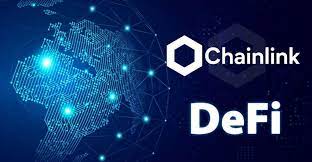The world of finance has been rapidly changing, and we’re at a point where traditional finance models are being disrupted by decentralized finance (DeFi) systems. One of the major challenges of DeFi is obtaining real-world data in a secure and reliable manner. This is where Chainlink comes in – as a decentralized oracle network that can help Growing Economy bridge the gap between the blockchain world and the real world. In this article, we’ll discuss the role of Chainlink in DeFi and its real-world applications.
What is Chainlink?
Chainlink is a decentralized oracle network that connects smart contracts to real-world data. In simple terms, Chainlink acts as a bridge between blockchain systems and real-world data sources. Smart contracts, which are self-executing contracts with the terms of the agreement between buyer and seller being directly written into lines of code, require real-world data to execute properly. This is where Chainlink comes in, as it allows smart contracts to securely access real-world data through its decentralized oracle network.
The Role of Chainlink in DeFi
DeFi systems are built on top of blockchain technology, and they aim to provide decentralized alternatives to traditional financial systems. DeFi protocols allow for the creation of decentralized applications (DApps) that can provide financial services such as lending, borrowing, and trading without the need for intermediaries like banks or financial institutions. However, to achieve this, DeFi protocols require access to real-world data that can be used to inform their financial operations.
Chainlink plays a crucial role in providing this real-world data to DeFi protocols. It provides a secure and reliable way for DeFi protocols to access data from various sources such as APIs, off-chain data, and other blockchain networks. This allows DeFi protocols to operate in a decentralized manner while still being able to access the necessary data to perform their financial operations.
Real-World Applications of Chainlink
Chainlink has numerous real-world applications in addition to its role in DeFi. For example, it can be used in supply chain management, where it can provide real-time data on the movement of goods and materials. It can also be used in insurance, where it can provide real-time data on weather conditions, traffic conditions, and other factors that can impact insurance claims.
Another real-world application of Chainlink is in gaming. It can provide real-time data on in-game events, which can be used to create unique gaming experiences. It can also be used in sports betting, where it can provide real-time data on the performance of players and teams.
Conclusion
Chainlink plays a critical role in the world of DeFi by providing a secure and reliable way for DeFi protocols to access real-world data. It also has numerous real-world applications beyond DeFi, such as in supply chain management, insurance, gaming, and sports betting. As the world of finance continues to evolve, Chainlink is well-positioned to play a critical role in providing secure and reliable access to real-world data for decentralized systems.
In conclusion, Bitcoin Loophole is an online trading platform that has been gaining popularity in recent years due to its user-friendly interface and the potential for high returns. With the integration of Chainlink, Bitcoin Loophole could potentially enhance its offerings by providing secure access to real-world data for its users. Whether you’re a DeFi enthusiast or just someone looking to explore the world of blockchain and decentralized systems, Chainlink is a technology that you should keep on your radar.

